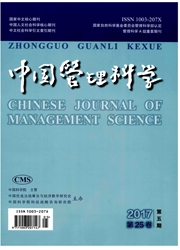

 中文摘要:
中文摘要:
已有研究较少同时考察供应链中制造商产品质量信号传递和零售商销售努力调整的问题。本文考虑零售商通过努力水平改变市场需求,且制造商分摊一定比例销售努力成本的情形,制造商在决定进行质量投资后,双方对制造商能否成为高质量类型各有不同的信念,零售商只能通过观察制造商提供的契约来修正关于制造商类型的信念,并确定产品销售价格与销售努力水平。构建博弈模型分析了双方的质量投资决策、销售努力决策、定价决策以及成本分摊比例。结果表明,在不考虑质量投资成本的情形下,制造商的质量投资能够达到帕累托最优。为了激励零售商付出最优促销努力水平,销售契约中规定销售成本分摊比例与惩罚措施,由于讨价还价的存在,实际的销售成本分摊比例小于对制造商最有利的成本分摊比例。对零售商而言,制造商承担的销售成本分摊比例并非越高越好,这意味着如果超过一定范围,制造商的成本分摊反而会损害零售商的利益。
 英文摘要:
英文摘要:
Few researches take both the product quality signal transfer of the manufacturer and the setting effort adjustment of the retailer into consideration in existing literature. So this paper, a two-echelon sup- ply chain is considered in which the retailer~ s selling effort can change the market demand leading to the manufacturer bearing a certain scale of the selling effort. The manufacturer decides whether to invest in improving product quality and both parties hold prior beliefs about the manufacturer's type in case of in- vestment. The retailer revises his belief according to the selling contract offered by the manufacturer, and then decides his selling price and selling effort. Quality investment decision, selling effort decision, pricing decision and the determination of cost allocation proportion of the players are analyzed by proposing the game model. It is shown that the manufacturer invests in product can lead to Pareto optimal when the in- vestment is costless. In order to incentive the retailer's optimal selling effort, the manufacturer will stipu- late a certain scale of the selling effort and penalty in the contract. However, in order to avoid the retailer from telling the lie, the retailer has to bear a smaller scale of selling effort than the optimal scale. Further- more, higher scale of selling effort the manufacturer bears is not always helpful for the retailer, which means that scale over a certain range will hurt the retailer.
 同期刊论文项目
同期刊论文项目
 同项目期刊论文
同项目期刊论文
 期刊信息
期刊信息
